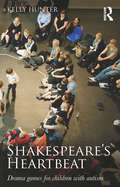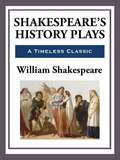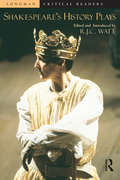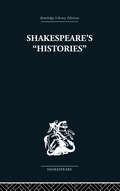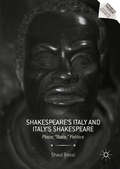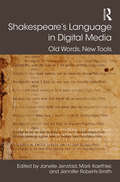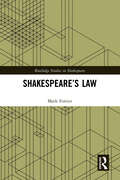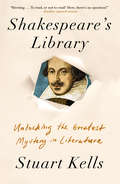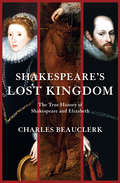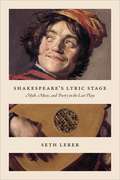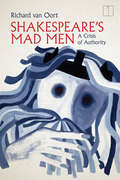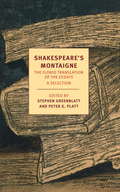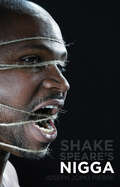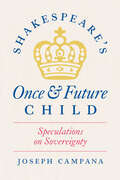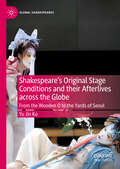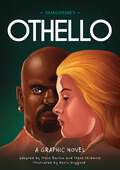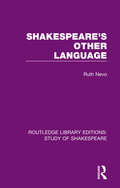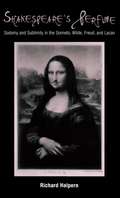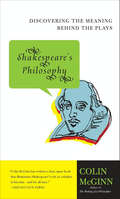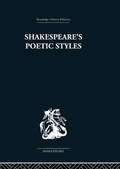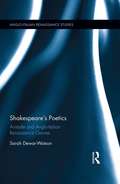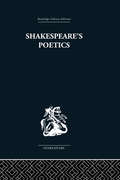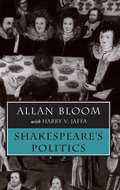- Table View
- List View
Shakespeare's Heartbeat: Drama games for children with autism
by Kelly HunterChildren on the autistic spectrum experience varying degrees of difficulties; all of which can be understood as a disassociation of mind and body. Expressing feelings, making eye contact, keeping a steady heartbeat and recognizing faces are all part of the autism dilemma which can be poetically explored by Shakespeare. Over ten years, Hunter worked with children on all points of the spectrum, developing drama games for the specific purpose of combatting autism. These unique games, derived from specific moments in the plays, shed new light on how to teach Shakespeare to children, using the drama as an exploration of how it feels to be alive. Shakespeare’s Heartbeat is a step-by-step guide, detailing how to demonstrate, play and share these sensory games. The book includes: Games based on A Midsummer Night’s Dream Games based on The Tempest Tips and advice for playing one-on-one with the children An afterword describing Hunter’s journey from performer and practitioner to creator of this work. Shakespeare’s poetic definitions of seeing, thinking and loving reveal the very processes that children with autism find so difficult to achieve. This book provides an indispensable learning tool for those wishing to encourage children’s eye contact and facial expression, improve their spatial awareness and language skills and introduce them to imaginative play.
Shakespeare's History Plays
by William ShakespeareA collection containing The First Part of King Henry IV, The Second Part of King Henry IV, The Life of King Henry V, The First Part of King henry VI, The Second Part of King Henry VI, The Third Part of King Henry VI, King Henry VIII, King John, King Richard II, and King Richard III
Shakespeare's History Plays (Longman Critical Readers)
by Robert WattShakespeare's history plays are central to his dramatic achievement. In recent years they have become more widely studied than ever, stimulating intensely contested interpretations, due to their relevance to central contemporary issues such as English, national identities and gender roles. Interpretations of the history plays have been transformed since the 1980s by new theoretically-informed critical approaches. Movements such as New Historicism and cultural materialism, as well as psychoanalytical and post-colonial approaches, have swept away the humanist consensus of the mid-twentieth century with its largely conservative view of the plays. The last decade has seen an emergence of feminist and gender-based readings of plays which were once thought overwhelmingly masculine in their concerns. This book provides an up-to-date critical anthology representing the best work from each of the modern theoretical perspectives. The introduction outlines the changing debate in an area which is now one of the liveliest in Shakespearean criticism.
Shakespeare's History: Mirrors of Elizabethan Policy.
by Lily B CampbellFirst published in 1947 in the USA. This edition reprints the first UK edition of 1964. Published to critical acclaim, the central argument of this book is that the historical play must be studied as a genre separate from tragedy and comedy. Just as there is in Shakespearean tragedies a dominant ethical pattern of passion opposed to reason, so there is in the history plays a dominant political pattern characteristic of the political philosophy of the age. From the 'troublesome reign' of King John to the 'tragical doings' of Richard III, Shakespeare wove the events of English history into plots of universal interest.
Shakespeare's Individualism
by Peter HolbrookProviding a provocative and original perspective on Shakespeare, Peter Holbrook argues that Shakespeare is an author friendly to such essentially modern and unruly notions as individuality, freedom, self-realization and authenticity. These expressive values vivify Shakespeare's own writing; they also form a continuous, and a central, part of the Shakespearean tradition. Engaging with the theme of the individual will in specific plays and poems, and examining a range of libertarian-minded scholarly and literary responses to Shakespeare over time, Shakespeare's Individualism advances the proposition that one of the key reasons for reading Shakespeare today is his commitment to individual liberty - even as we recognize that freedom is not just an indispensable ideal but also, potentially, a dangerous one. Engagingly written and jargon free, this book demonstrates that Shakespeare has important things to say about fundamental issues of human existence.
Shakespeare's Italy and Italy's Shakespeare
by Shaul BassiShaul Bassi is AssociateProfessor of English and Postcolonial Literature at Ca'Foscari University ofVenice, Italy. His publications include Visionsof Venice in Shakespeare, with Laura Tosi, and Experiences of Freedom in Postcolonial Literatures and Cultures, with Annalisa Oboe.
Shakespeare's Language in Digital Media: Old Words, New Tools (Digital Research in the Arts and Humanities)
by Janelle Jenstad Mark Kaethler Jennifer Roberts-SmithThe authors of this book ask how digital research tools are changing the ways in which practicing editors historicize Shakespeare's language. Scholars now encounter, interpret, and disseminate Shakespeare's language through an increasing variety of digital resources, including online editions such as the Internet Shakespeare Editions (ISE), searchable lexical corpora such as the Early English Books Online-Text Creation Partnership (EEBO-TCP) or the Lexicons of Early Modern English (LEME) collections, high-quality digital facsimiles such as the Folger Shakespeare Library's Digital Image Collection, text visualization tools such as Voyant, apps for reading and editing on mobile devices, and more. What new insights do these tools offer about the ways Shakespeare's words made meaning in their own time? What kinds of historical or historicizing arguments can digital editions make about Shakespeare's language? A growing body of work in the digital humanities allows textual critics to explore new approaches to editing in digital environments, and enables language historians to ask and answer new questions about Shakespeare's words. The authors in this unique book explicitly bring together the two fields of textual criticism and language history in an exploration of the ways in which new tools are expanding our understanding of Early Modern English.
Shakespeare's Law (Routledge Studies in Shakespeare)
by Mark FortierShakespeare's Law is a critical overview of law and legal issues within the life, career, and works of William Shakespeare as well as those that arise from the endless array of activities that happen today in the name of Shakespeare. Mark Fortier argues that Shakespeare’s attitudes to law are complex and not always sanguine, that there exists a deep and perhaps ultimate move beyond law very different from what a lawyer or legal scholar might recognize. Fortier looks in detail at the legal issues most prominent across Shakespeare’s work: status, inheritance, fraud, property, contract, tort (especially slander), evidence, crime, political authority, trials, and the relative value of law and justice. He also includes two detailed case studies, of The Merchant of Venice and Measure for Measure, as well as a chapter looking at law in works by Shakespeare's contemporaries. The book concludes with a chapter on the law as it relates to Shakespeare today. The book shows that the legal issues in Shakespeare are often relevant to issues we face now, and the exploration of law in Shakespeare is as germane today, though in sometimes new ways, as in the past.
Shakespeare's Library: Unlocking the Greatest Mystery in Literature
by Stuart KellsA tantalizing true story of one of literature’s most enduring enigmas is at the heart of this “lively, even sprightly book” (Michael Dirda, The Washington Post)—the quest to find the personal library of the world’s greatest writer.Millions of words of scholarship have been expended on the world’s most famous author and his work. And yet a critical part of the puzzle, Shakespeare’s library, is a mystery. For four centuries people have searched for it: in mansions, palaces and libraries; in riverbeds, sheep pens and partridge coops; and in the corridors of the mind. Yet no trace of the bard’s manuscripts, books or letters has ever been found.The search for Shakespeare’s library is much more than a treasure hunt. Knowing what the Bard read informs our reading of his work, and it offers insight into the mythos of Shakespeare and the debate around authorship. The library’s fate has profound implications for literature, for national and cultural identity, and for the global Shakespeare industry. It bears on fundamental principles of art, identity, history, meaning and truth.Unfolding the search like the mystery story that it is, acclaimed author Stuart Kells follows the trail of the hunters, taking us through different conceptions of the library and of the man himself. Entertaining and enlightening, Shakespeare’s Library is a captivating exploration of one of literature’s most enduring enigmas."An engaging and provocative contribution to the unending world of Shakespeariana . . . An enchanting work that bibliophiles will savor and Shakespeare fans adore." ―Kirkus Reviews
Shakespeare's Lost Kingdom: The True History of Shakespeare and Elizabeth
by Charles Beauclerk“A book for anyone who loves Shakespeare . . . One of the most scandalous and potentially revolutionary theories about the authorship of these immortal works” (Mark Rylance, First Artistic Director of Shakespeare’s Globe Theatre). It is perhaps the greatest story never told: the truth behind the most enduring works of literature in the English language, perhaps in any language. Who was William Shakespeare? Critically acclaimed historian Charles Beauclerk has spent more than two decades researching the authorship question, and if the plays were discovered today, he argues, we would see them for what they are—shocking political works written by a court insider, someone with the monarch’s indulgence, shielded from repression in an unstable time of armada and reformation. But the author’s identity was quickly swept under the rug after his death. The official history—of an uneducated merchant writing in near obscurity, and of a virginal queen married to her country—dominated for centuries. Shakespeare’s Lost Kingdom delves deep into the conflicts and personalities of Elizabethan England, as well as the plays themselves, to tell the true story of the “Soul of the Age.” “Beauclerk’s learned, deep scholarship, compelling research, engaging style and convincing interpretation won me completely. He has made me view the whole Elizabethan world afresh. The plays glow with new life, exciting and real, infused with the soul of a man too long denied his inheritance.” —Sir Derek Jacobi
Shakespeare's Lyric Stage: Myth, Music, and Poetry in the Last Plays
by Seth LererWhat does it mean to have an emotional response to poetry and music? And, just as important but considered less often, what does it mean not to have such a response? What happens when lyric utterances—which should invite consolation, revelation, and connection—somehow fall short of the listener’s expectations? As Seth Lerer shows in this pioneering book, Shakespeare’s late plays invite us to contemplate that very question, offering up lyric as a displaced and sometimes desperate antidote to situations of duress or powerlessness. Lerer argues that the theme of lyric misalignment running throughout The Tempest, The Winter’s Tale, Henry VIII, and Cymbeline serves a political purpose, a last-ditch effort at transformation for characters and audiences who had lived through witch-hunting, plague, regime change, political conspiracies, and public executions. A deep dive into the relationship between aesthetics and politics, this book also explores what Shakespearean lyric is able to recuperate for these “victims of history” by virtue of its disjointed utterances. To this end, Lerer establishes the concept of mythic lyricism: an estranging use of songs and poetry that functions to recreate the past as present, to empower the mythic dead, and to restore a bit of magic to the commonplaces and commodities of Jacobean England. Reading against the devotion to form and prosody common in Shakespeare scholarship, Lerer’s account of lyric utterance’s vexed role in his late works offers new ways to understand generational distance and cultural change throughout the playwright’s oeuvre.
Shakespeare's Mad Men: A Crisis of Authority (Square One: First-Order Questions in the Humanities)
by Richard van OortThis book is about a mad king and a mad duke. With original and iconoclastic readings, Richard van Oort pioneers the reading of Shakespeare as an ethical thinker of the "originary scene," the scene in which humans became conscious of themselves as symbol-using moral and narrative beings. Taking King Lear and Measure for Measure as case studies, van Oort shows how the minimal concept of an anthropological scene of origin—the "originary hypothesis"—provides the basis for a new understanding of every aspect of the plays, from the psychology of the characters to the ethical and dialogical conflicts upon which the drama is based. The result is a gripping commentary on the plays. Why does Lear abdicate and go mad? Why does Edgar torture his father with non-recognition? Why does Lucio accuse the Duke in Measure for Measure of madness and lechery, and why does Isabella remain silent at the end? In approaching these and other questions from the perspective of the originary hypothesis, van Oort helps us to see the ethical predicament of the plays, and, in the process, makes Shakespeare new again.
Shakespeare's Montaigne
by Michel De Montaigne Stephen Greenblatt John Florio Peter G. PlattAn NYRB Classics OriginalShakespeare, Nietzsche wrote, was Montaigne's best reader--a typically brilliant Nietzschean insight, capturing the intimate relationship between Montaigne's ever-changing record of the self and Shakespeare's kaleidoscopic register of human character. And there is no doubt that Shakespeare read Montaigne--though how extensively remains a matter of debate--and that the translation he read him in was that of John Florio, a fascinating polymath, man-about-town, and dazzlingly inventive writer himself.Florio's Montaigne is in fact one of the masterpieces of English prose, with a stylistic range and felicity and passages of deep lingering music that make it comparable to Sir Robert Burton's Anatomy of Melancholy and the works of Sir Thomas Browne. This new edition of this seminal work, edited by Stephen Greenblatt and Peter G. Platt, features an adroitly modernized text, an essay in which Greenblatt discusses both the resemblances and real tensions between Montaigne's and Shakespeare's visions of the world, and Platt's introduction to the life and times of the extraordinary Florio. Altogether, this book provides a remarkable new experience of not just two but three great writers who ushered in the modern world.
Shakespeare's Nigga
by Joseph Jomo PierreShakespeare holds the fate of several black slaves in his hands. Among them are the rebellious Aaron and the obedient Othello, who each have complicated relationships with Shakespeare's daughter, Judith. But a vital secret remains hidden that could untangle complex familial ties and change the course of their history.
Shakespeare's Once and Future Child: Speculations on Sovereignty
by Joseph CampanaA study of Shakespeare’s child figures in relation to their own political moment, as well as our own. Politicians are fond of saying that “children are the future.” How did the child become a figure for our political hopes? Joseph Campana’s book locates the source of this idea in transformations of childhood and political sovereignty during the age of Shakespeare, changes spectacularly dramatized by the playwright himself. Shakespeare’s works feature far more child figures—and more politically entangled children—than other literary or theatrical works of the era. Campana delves into this rich corpus to show how children and childhood expose assumptions about the shape of an ideal polity, the nature of citizenship, the growing importance of population and demographics, and the question of what is or is not human. As our ability to imagine viable futures on our planet feels ever more limited, and as children take up legal proceedings to sue on behalf of the future, it behooves us to understand the way past child figures haunt our conversations about intergenerational justice. Shakespeare offers critical precedents for questions we still struggle to answer.
Shakespeare's Original Stage Conditions and their Afterlives across the Globe: From the Wooden O to the Yards of Seoul (Global Shakespeares)
by Yu Jin KoThis book brings together two separate fields by combining a study of Shakespeare's original stage conditions with an exploration of his plays in performance across the globe. The book contributes new insights into how early-modern stage conditions shaped the writing, production, and reception of Shakespeare's plays, but takes the further step of examining how original stage conditions re-emerge, not only in Globe replicas like the London Globe, but in unexpected and sometimes unconscious reconfigurations in adaptations and productions from around the world: film versions of Othello from Mexico to India that take dancing cues and anxieties about dance from the play and centralize dance; Korean adaptations for the madang (or yard) that reimagine Shakespeare's theatrical spaces and their relationships to audiences; Noh re-imaginings on film and onstage that foreground the theatrical; a teen film remake of Othello that raises questions about how blackness is figured today and on Shakespeare's stage, among others. By studying original stage conditions and their global afterlives, the book illuminates how global productions negotiate historical and cultural differences and thereby, paradoxically, engage with the cultural specificities of the present.
Shakespeare's Othello: A Graphic Novel (Classics in Graphics #8)
by Steve Skidmore Steve BarlowShakespeare's Othello like you've never seen it - or read it - before! Classics in Graphics: Othello has been adapted into a graphic novel by expert authors, Steve Skidmore and Steve Barlow, with illustrations by Kevin Hopgood and Martyn Cain. Watch Iago's slimy plan play out like an irresistible thriller - as Othello's self-doubt turns to fury and becomes more and more consuming.Classics in Graphics is a series of graphic novels for readers aged 10 plus that has inclusion at its heart, flinging wide the doors of literature for all to enter and understand. Including dyslexia-friendly design and encouraging readers to relate to iconic roles - casting spells, falling in love and winning duels. Each graphic novel includes pitch-perfect illustrations for depicting tragedy, romance, comedy or magic PLUS: - snappy simplified text presenting Shakespeare's themes clearly - introductory materials to help set the scene and context of each story - heaps of extra material at the back to keep the learning and fun going, including an exploration of themes in the play, the language, Shakespeare's inspirations, the publication and performance of the play in history, a timeline of Shakespeare's life and works, and much more! Plays available in the series include: Macbeth, The Tempest, Hamlet, Romeo and Juliet, A Midsummer Night's Dream, Much Ado About Nothing, Othello, Twelfth NightPraise for Classics in Graphics: "[...] an encouraging entry point to Shakespeare for my kids, and [...] an excellent job converting challenging language and literary themes to make it very inclusive, smoothing ease of understanding dialogue, plot, and narration without dumbing it down." - EricWilliamson, leagueofcomicgeeks.com
Shakespeare's Other Language (Routledge Library Editions: Study of Shakespeare)
by Ruth NevoShakespeare’s last plays, the tragicomic Romances, are notoriously strange plays, riddled with fabulous events and incredible coincidences, magic and dream. These features have sometimes been interpreted as the carelessness of an of an aging dramatist weary of his craft, or justified as folklore motifs, suitable to the romance tale. But neither view explains the fascination and power these plays still exert. Originally published in 1987, Ruth Nevo’s book offers a reading of the plays which invokes the findings and methods of post-psychoanalytic semiotics. Drawing on a Lacanian model of the "textual unconscious", she embarks on searching analyses of Pericles, Cymbeline, The Winter’s Tale, and The Tempest, brilliantly illuminating their apparent absurdities and anomalies, their bizarre or preposterous events and obscurely motivated actions, their often puzzling syntax. Her investigation of the plays’ informing fantasies produces unified and enriched readings which serve both to rehabilitate those plays which have been less than highly thought of, and to disclose new significance in the acknowledged masterpieces.
Shakespeare's Perfume: Sodomy and Sublimity in the Sonnets, Wilde, Freud, and Lacan
by Richard HalpernStarting with St. Paul's argument that the Greeks were afflicted with homosexuality to punish their excessive love of statues, Richard Halpern uncovers a tradition in which aesthetic experience gives birth to the sexual—and thus reverses the Freudian thesis that erotic desire is sublimated into art. Rather, Halpern argues, sodomy was implicated with aesthetic categories from the very start, as he traces a connection between sodomy and the unrepresentable that runs from Shakespeare's Sonnets to Oscar Wilde's novella The Portrait of Mr. W.H., Freud's famous essay on Leonardo da Vinci, and Jacques Lacan's seminar on the ethics of psychoanalysis. Drawing on theology, alchemy, psychoanalysis, philosophy, and literary criticism, Shakespeare's Perfume explores how the history of aesthetics and the history of sexuality are fundamentally connected.
Shakespeare's Philosophy: Discovering the Meaning Behind the Plays
by Colin McGinnShakespeare’s plays are usually studied by literary scholars and historians and the books about him from those perspectives are legion. It is most unusual for a trained philosopher to give us his insight, as Colin McGinn does here, into six of Shakespeare’s greatest plays–A Midsummer Night’s Dream, Hamlet, Othello, Macbeth, King Lear, and The Tempest. In his brilliant commentary, McGinn explores Shakespeare’s philosophy of life and illustrates how he was influenced, for example, by the essays of Montaigne that were translated into English while Shakespeare was writing. In addition to chapters on the great plays, there are also essays on Shakespeare and gender and his plays from the aspects of psychology, ethics, and tragedy.As McGinn says about Shakespeare, “There is not a sentimental bone in his body. He has the curiosity of a scientist, the judgment of a philosopher, and the soul of a poet.” McGinn relates the ideas in the plays to the later philosophers such as David Hume and the modern commentaries of critics such as Harold Bloom. The book is an exhilarating reading experience, especially for students who are discovering the greatest writer in English.
Shakespeare's Poetic Styles: Verse into Drama
by John BaxterFirst published in 1980. At their most successful, Shakespeare's styles are strategies to make plain the limits of thought and feeling which define the significance of human actions. John Baxter analyses the way in which these limits are reached, and also provides a strong argument for the idea that the power of Shakespearean drama depends upon the co-operation of poetic style and dramatic form. Three plays are examined in detail in the text: The Tragedy of Mustapha by Fulke Greville and Richard II and Macbeth by Shakespeare.
Shakespeare's Poetics: Aristotle and Anglo-Italian Renaissance Genres (Anglo-Italian Renaissance Studies)
by Sarah Dewar-WatsonThe startling central idea behind this study is that the rediscovery of Aristotle's Poetics in the sixteenth century ultimately had a profound impact on almost every aspect of Shakespeare's late plays”their sources, subject matter and thematic concerns. Shakespeare's Poetics reveals the generic complexity of Shakespeare's late plays to be informed by contemporary debates about the tonal and structural composition of tragicomedy. Author Sarah Dewar-Watson re-examines such plays as The Winter's Tale, Pericles and The Tempest in light of the important work of reception which was undertaken in Italy by pioneering theorists such as Giambattista Giraldi Cinthio (1504-73) and Giambattista Guarini (1538-1612). The author demonstrates ways in which these theoretical developments filtered from their intellectual base in Italy to the playhouses of early modern England via the work of dramatists such as Jonson and Fletcher. Dewar-Watson argues that the effect of this widespread revaluation of genre not only extends as far as Shakespeare, but that he takes a leading role in developing its possibilities on the English stage. In the course of pursuing this topic, Dewar-Watson also engages with several areas of current scholarly debate: the nature of Shakespeare's authorship; recent interest in and work on Shakespeare's later plays; and new critical work on Italian language-learning in Renaissance England. Finally, Shakespeare's Poetics develops current critical thinking about the place of Greek literature in Renaissance England, particularly in relation to Shakespeare.
Shakespeare's Poetics: In relation to King Lear
by Russell A FraserFirst published in 1962. This volume gives as complete an account as possible of the Shakespearian experience, particularly in terms of one play, King Lear, but in general against the context of all of Shakespeare's work and that of the age in which it was created. Chapters cover: King Lear in the Renaissance; Providence; Kind; Fortune; Anarchy and Order; Reason and Will; Show and Substance; Redemption and Shakespeare's Poetics.
Shakespeare's Politics
by Allan Bloom Harry V. JaffaTaking the classical view that the political shapes man's consciousness, Allan Bloom considers Shakespeare as a profoundly political Renaissance dramatist. He aims to recover Shakespeare's ideas and beliefs and to make his work once again a recognized source for the serious study of moral and political problems. In essays looking at Julius Caesar, Othello, and The Merchant of Venice, Bloom shows how Shakespeare presents a picture of man that does not assume privileged access for only literary criticism. With this claim, he argues that political philosophy offers a comprehensive framework within which the problems of the Shakespearean heroes can be viewed. In short, he argues that Shakespeare was an eminently political author. Also included is an essay by Harry V. Jaffa on the limits of politics in King Lear.
Shakespeare's Possible Worlds
by Simon PalfreyNew methods are needed to do justice to Shakespeare. His work exceeds conventional models, past and present, for understanding playworlds. In this book, Simon Palfrey goes right to the heart of early modern popular drama, revealing both how it works and why it matters. Unlike his contemporaries, Shakespeare gives independent life to all his instruments, and to every fraction and fragment of the plays. Palfrey terms these particles 'formactions' - theatre-specific forms that move with their own action and passion. Palfrey's book is critically daring in both substance and format. Its unique mix of imaginative gusto, thought experiments, and virtuosic technique generates piercing close readings of the plays. There is far more to playlife than meets the eye. Influenced by Leibniz's visionary original model of possible worlds, Palfrey opens up the multiple worlds of Shakespeare's language, scenes, and characters as never before.
